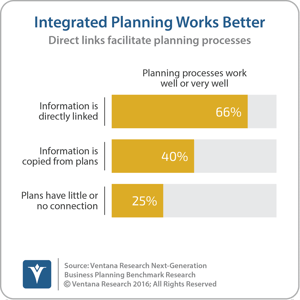Workday will acquire Adaptive Insights for $1.55 billion in cash, with the transaction scheduled to close in the third quarter of this year. The combination adds Adaptive Insight’s well-developed cloud-based financial performance management software to Workday’s workforce and financial management suite. Workday says Adaptive will operate as a standalone business and continue with its current product strategy.
Although Adaptive Planning already had established integrations with Workday its product will remain a separate application. On the analyst call following the announcement, management stated that the immediate development issues are integrating the security model (which will support a single login for users of Adaptive and Workday), harmonizing metadata and the data model (to support a tighter integration between the financials and planning application) and making the product’s user interface consistent with Workday’s. I also expect that there will be ongoing work aimed at enhancing the scalability of the Adaptive Insights application and enriching the statutory consolidations capabilities to address the needs of larger corporations.
The economic rationale for the combination is that it provides Workday with a cloud-based financial performance management suite sooner than if it were to build it internally. The acquisition will pay off for Workday if it is able to generate significant additional subscription revenue to justify paying 13.6-times trailing four-quarters (ending April 2018) revenue for Adaptive and about twice the pending IPO valuation.
In concept, incremental subscription increases initially would be achievable by tapping into Workday’s existing customer base and sales resources. For example, dedicated Adaptive sales reps can be deployed quickly and relatively inexpensively to Workday’s worldwide offices compared to what it would have cost Adaptive Insights to do the same as a standalone company. Longer-term incremental growth likely will require the announced deeper integration and scalability investments that are planned. And it will require Workday’s customers to embrace an approach to planning and budgeting that I call “integrated business planning” (IBP).
I reviewed Workday Planning when it was first released. Its core strength has been the tight integration of its workforce planning with Workday’s human capital management suite. Workday Planning will continue to address the workforce planning role going forward. As I’ve noted, the financial component was more of a budgeting than a business planning tool. The integration with the general ledger makes it easier for managers in higher education, government and nonprofit organizations to keep a tight grip on spending. Budgeting – a form of financial planning – satisfies the needs of entities in these sectors that must manage to a set of fixed allocations for expenditures. However, beyond fiscal control, budgeting capability has limited benefit for corporations that operate in dynamic markets.
I coined the term integrated business planning in 2009 to describe an enterprise-wide planning effort where the planning of each functional part of the company is linked to the plans of others in a persistent fashion. The term represents an approach to planning that provides more business value to an organization than budgeting alone. Businesses plan to determine the best way to succeed in reaching their goals. Budgeting is a financial control mechanism designed to prevent companies from failing because of overspending and serves the needs of the finance department in managing outlays and cash flows. It is essential for fiscal control but it has limited value for managing the operational parts of the business. IBP is designed to serve both needs.
Planning takes place across an entire enterprise – in sales, marketing, operations, finance and human resources – but today most of these plans stand alone. At best they are only indirectly linked, usually in the form of the company budget. Even here, our Next-Generation Business Planning benchmark research shows that only 30 percent of companies link individual business unit budgets together. The rest rely on less complete summaries over the budget period. Without direct links, updates are time-consuming.
Integrated business planning makes it possible to shorten planning cycles to promote agility and give better visibility into expectations across a company; this enables improved coordination and strategic alignment. Our research finds that two-thirds (66%) of companies that directly link information from business unit plans to a central plan have a planning  process that works well. By contrast, only 40 percent of companies that copy the output of individual plans to a companywide plan have a planning process that works well and just 25 percent that have little or no connection between plans have a process that works well.
process that works well. By contrast, only 40 percent of companies that copy the output of individual plans to a companywide plan have a planning process that works well and just 25 percent that have little or no connection between plans have a process that works well.
Although packaged planning and budgeting applications is a mature category (it’s been around in its current form since the 1980s) and the marketplace is crowded, standalone spreadsheets are still the software finance departments use most often. Our Office of Finance benchmark research finds that three-fourths (74%) of midsize and larger companies utilize them to manage their planning and budgeting processes. Workday’s opportunity in acquiring Adaptive Insights lies in convincing corporations to adopt an integrated business planning approach to planning and budgeting to replace their existing silo-based planning and financial budgeting activities. Then, of course, is the task of having them choose its software over multiple rivals in this category. Although corporations are slow to change ingrained habits such as the annual budget ritual, it’s possible that integrated business planning’s time has come.
Regards,
Robert Kugel
SVP & Research Director


 process that works well. By contrast, only 40
process that works well. By contrast, only 40








